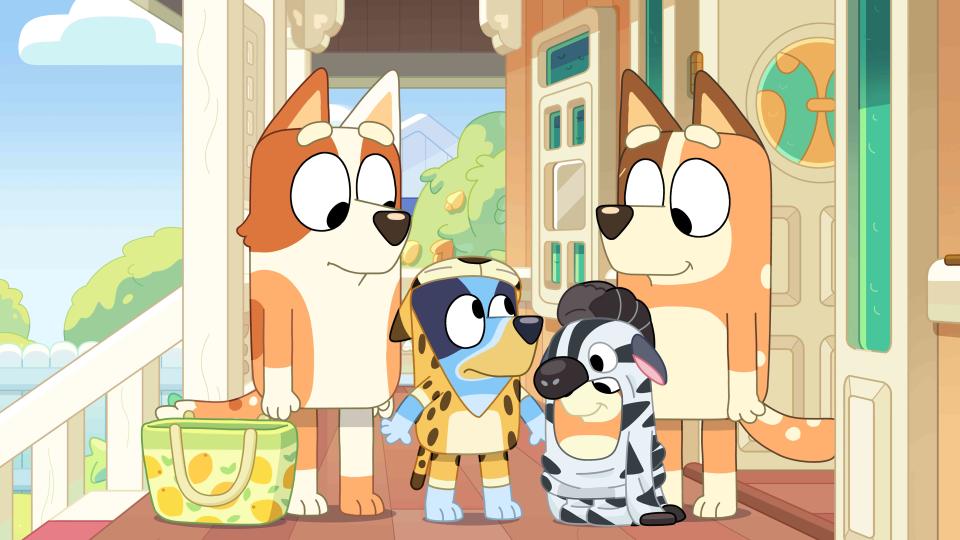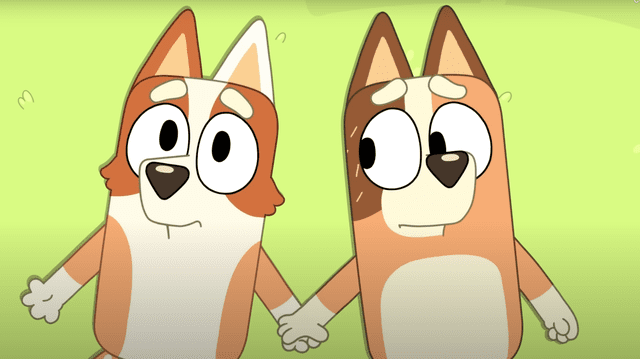This ‘Bluey’ Episode Is the Recognition I Needed After My Miscarriages
'Onesies' is the six minutes of television you need to watch to understand loss during National Pregnancy and Infant Loss Awareness Month.

Disney/Ludo Studio
Hearing the words, “There’s no heartbeat,” shattered me as I held my husband’s hand and cried in the darkness of the exam room. Having never learned about the many ways families experience loss when I was younger, as an adult I felt untethered, and completely and totally alone.
Few life experiences equal the heartache of pregnancy loss, infertility, and other obstacles to welcoming children into a family.
As a woman in my 30s, I felt completely ill-equipped to navigate this season of life, as I experienced not one, but two miscarriages before we brought home our babies. When I was a girl, these topics—and many of those that dealt with loss and heartache—were shrouded in mystery, relegated to the adult world, and almost never discussed.
Thankfully, for the young people of this generation conversations around loss are beginning to change. Within the past few years, we’ve seen a cultural shift as more and more families share their fertility journeys and experiences with pregnancy loss. Social media, news reports, celebrity transparency, and myriad other modes of storytelling are bringing increased attention and visibility, creating a sense of community for those processing difficult experiences. Years after our losses, I no longer feel as alone as I once did—in large part because of the countless stories I’ve heard from other families that helped me understand that our grief, while personal to us, was also common.
And while many adults may still shy away from discussing loss experiences with children, many champion normalizing a kaleidoscope of family life experiences for the youngest members of society—a goal arguably best pursued through children’s entertainment venues.
For example, many fans of the children’s show Bluey will remember a subtle reference to the possible pregnancy loss experienced by the title character’s mother, Chili, in the Season 2 episode, “The Show,” and the subsequent social media commentary that opened the door to countless conversations about loss, miscarriage, and rainbow babies.
Bluey’s recent season 3 episode, “Onesies,” explores how fertility journeys affect not only those navigating them but also their relationships with friends and family members. For many parents and their children, such representation can prove incredibly meaningful, helping normalize their stories and bringing light to the obstacles they navigated—or are perhaps still navigating. In places where access to reliable reproductive care is being rolled back, including in an increasing number of U.S. states, understanding the many different journeys people follow to parenthood gains significance with each passing day.
Throughout the episode, we come to realize that Brandy, Chili’s sister, has been mysteriously absent from the Heeler family’s life for the past four years. This long absence has affected the two sisters profoundly, and each cycles through glimpses of guilt, embarrassment, longing, grief, regret, sadness, and confusion with each changing scene.

Disney/Ludo Studio
As adults, many of us understand how difficult it can be to witness friends and family walk the heartbreaking path of infertility, knowing that nothing we can do will ease their pain.
Chili gives voice to this when she explains patiently to her daughter, “There’s something Auntie Brandy wants more than anything [...] …but she can’t have it. And there’s not really anything anyone can do. […] Because it’s not meant to be.”
While it’s never explicitly stated what Brandy is navigating (infertility? pregnancy loss? unfulfilled desire for a family?) we can infer from her reaching for her niece, Bingo, as she runs away, that this unfulfilled “wish” is something related to children or family—a wish anyone who has navigated pregnancy loss or infertility can deeply relate to.
I watched this episode while braiding my daughter’s hair, tears streaming down my face, and realized that I had lived the experience of both sisters.
In the years before our third (and first successful) pregnancy, I lived with the overwhelming grief of waiting with empty arms as others around me welcomed babies of their own, and felt deeply alone in our losses.
When we finally welcomed our baby girl, I learned a heartache of a different kind, that of wanting to share a long-waited-for child with loved ones who distanced themselves. As my relationships with those around me shifted and changed, I also learned to reach for compassion and understanding when we were met with silence or absence as loved ones continued navigating their own paths to parenthood. Texts I sent went unanswered, calls were not returned, and coffee dates were rescheduled when “something came up.”
Another kind of loss came in the form of the self-editing I myself performed as I navigated the line between not sharing enough and sharing too much with those I hoped to remain close to. While my life increasingly revolved around my children, more and more my struggles and accomplishments seemed increasingly to center in the sphere of motherhood.
Lack of access to reliable childcare for months on end throughout the pandemic and in the years following meant my days were spent with one or more of my children by my side. Editing them out of daily experiences I shared with others seemed not only disingenuous but also something I had no wish to do. I loved this immersive experience of motherhood I had fought for too much––and so, rather than try to decide which of a thousand anecdotes offered just the right update into my child-filled life, at times I shared nothing at all.
That memory in turn led to another question as the Bluey credits played, and my daughter clamored for one more episode: Brandy may not have visited, but did Chili fail to call? Did she slip away, as I did, neglecting to reach out, fearful that by trying to share updates about her children she may in fact bring even more pain to someone she so deeply loved? Was she afraid that by reveling in the joy she found in motherhood, she might in fact highlight for her sister what she dreamed of for herself but lacked?
While I never stayed away for years, I can relate to Brandy’s decision to give herself time and distance when she needed it. When we experienced pregnancy loss, being around other pregnant women and children was too painful for me as I grieved the babies my body failed again and again to carry to term. I politely declined invitations to children’s birthday parties, sent gifts to baby showers (but didn’t attend due to “schedule conflicts”, and deleted social media apps that at any moment might showcase the dozens of smiling babies that flooded my feeds.
For my part, when I gave myself the space and time needed to navigate our pregnancy losses, I especially appreciated the kindness that friends with children showed us. They never asked why we didn’t attend their children’s parties, never pressed us to visit after birth, nor requested we hold their babies, and tactfully talked about work, gossip, and TV when we chatted. While we rarely discussed our grief with them, the fact that they allowed us to take the time we needed to heal made us feel seen–and loved.
For me, the most poignant moment of this episode came when Chili explained to her daughter Bluey why Aunt Brandy seemed so sad. With her straightforward acknowledgment of the grief and longing her sister feels, Chili Heeler brings validation to her sister’s pain. And though she leans on the “not meant to be” trope that many of us in the infertility community find objectionable, this acknowledgment of grief is something many people struggle to do for their own loved ones, especially when they might need it most.
People’s continued enthusiasm for positive thinking in the face of loss is perhaps forgivable since optimism is often less painful than recognizing a difficult truth: that many families struggling with infertility wish for something no one can give them.
It’s not necessarily true that “it will happen when it’s meant to” or that everyone who wants to become a parent is guaranteed a happy ending “someday.” Whether the reasons are fundamentally biological, financial, or simply “unexplained,” it’s a sad truth that some individuals will never have biological children, no matter how patient or optimistic they are as they wait.
To the uninitiated, Bluey may seem like just another children’s TV series to add to the morning lineup. Yet through the dozens of thoughtful lessons, the show’s creators dream up each season, I and countless parents across the globe have found so much more. I hope that other creators––and those who support them—recognize the power of such stories, and continue adding to the increasingly diverse set of narratives that shape our collective understandings of parenthood, loss, and joy.
As a mother who has walked a difficult road to parenthood, I see a deeply valuable teaching tool that can help my children learn about kindness and empathy for others. With lessons about loss, heartache, and difference, these eight-minute episodes offer something that lasts much longer—hopefully helping build a future when all families and family-building experiences can be celebrated compassionately. While my children may not fully understand these messages now, I imagine these lessons will stay with them long past childhood—so they can be truly loving and caring when their family, their friends, or even they, themselves, need it most.
For more Parents news, make sure to sign up for our newsletter!
Read the original article on Parents.

